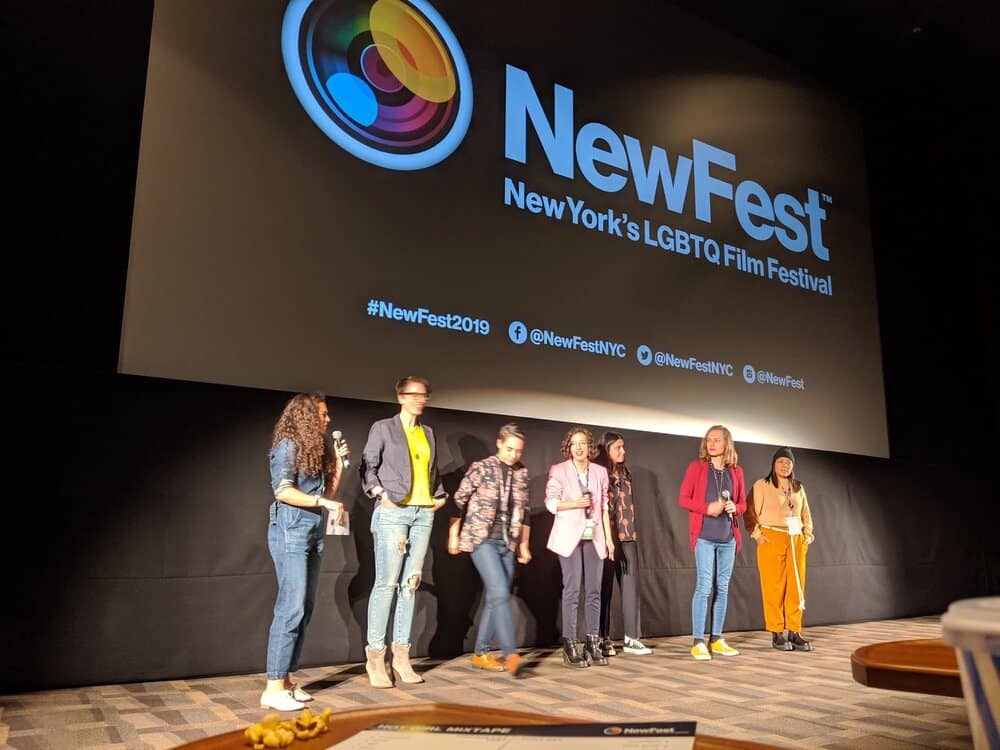While the aforementioned three films successfully explored the intimacy of romantic relationships, other films within the showcase casted a larger analytic net, highlighting issues that impact entire communities. For example, directed by Abena Taylor-Smith, Ladies Day introduced the audience to the racial, gender, and sexual politics of British black hair salons. With close cut shots of Luster’s Pink™ hair spray, Kanekalon braiding hair, and sizzling hot combs, the film’s cinematography conveys a kind of reverence for these culturally defining relics of black femininity. However, this loving treatment of the black hair salon sits alongside the discomforting reality of both the subtle and explicit displays of homophobia that occur within it. They range from narrow and restrictive gender expectations to outright bigotry. The protagonist, Amma, quietly and uncomfortably observes these dynamics as she gets her hair braided, all the while dodging invasive and presumptuous questions about why she doesn’t have a boyfriend. Unbeknownst to the older stylist, however, Amma does in fact have a romantic partner — that partner just happens to be a woman. Surely to the audience’s delight, Amma overcomes the initial hesitancy around her queerness with which she started the film, acknowledging and introducing her partner to the salon’s stylists by the film’s end. In effect, the film uses a near universal experience — that is, going to the hair salon —in order to present a neat, feel-good coming-out narrative.
In some ways, the film Origin (directed by Simone Lyles)presents a counter-narrative to the feel-good coming-out narrative of Ladies Day. Although both films feature two black women dealing with the homophobia that exists within their respective communities, Origin, which is set in the early 1980s,demonstrates the process by which individuals can internalize the very ways of thinking that seek to harm them. The protagonist, Kora, painfully attempts to repress her love for her best friend by relying on conversion therapy tapes. The tapes, of course, are not successful and instead serve as an unsettling reminder of the emotional and psychological violence that religious institutions have inflicted on queer people.
Other highlights of the showcase included Misdirection, directed by Carly Usine,and Dress Code, directed by Melanie Notinger. Clever, adorable, and sobering, Misdirection follows college freshman Camila as she manages both her obsessive compulsive disorder, as well as her unrequited love for her (presumably) very straight roommate. Interestingly, she finds the solution to both of these issues in the form of magic tricks, pouring her energy in mastering her new craft. By the film’s conclusion, Camila has not only become an impressive magician, but she has also reciprocated the romantic interest of another classmate that she previously ignored. Finally, while more serious in tone, Dress Code similarly tracks a journey of self-discovery: Dani, an introverted poetry student, experiments with her gender expression through her styling choices. Rich in color and sophisticated in tone, the film offers Dani’s fascination with drag performance as an invitation for the audience to think through the literal performance of gender.
To my delight, the MyGirlFriday after party, hosted at the Ace Hotel in Chelsea, ended the night just as it began: with devastatingly stylish queer women and non-binary folk celebrating the talent of these bold, fresh filmmakers.
Keyanah Nurse is the Senior Editor for Honeysuckle Magazine and a PhD candidate in the Department of History at NYU. You can find her musings on love, sex, race, whisky, and makeup on Twitter @KeyanahNurse.



